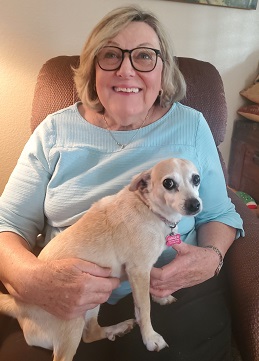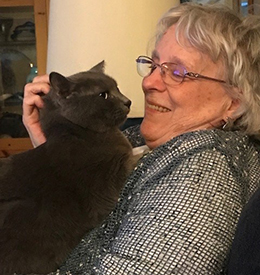UC Davis Hospice provides peace of mind for pet-owning patients
It’s not uncommon for a UC Davis Hospice patient to own a pet. But what happens to the pet when a patient comes to hospice care, and what happens after the patient passes away?
Thanks to a new partnership with Pet Peace of Mind, UC Davis Hospice can now assist with caring for the patient’s pet during the final days, including finding new homes for the pets afterward.
Pet Peace of Mind is a national program that serves more than 3,500 patients and 4,000 pets nationally. The team trains hospices to support patients’ pet care needs in practical ways by deploying trained local volunteers. This allows patients to complete their end-of-life journey without worrying about their pets' future needs.
“Pet Peace of Mind is keeping people and pets together at a challenging and critical time when they need each other the most, and we’re so proud to celebrate their efforts,” Steven Feldman, president of Human Animal Bond Research Institute, said in a press release.
UC Davis Hospice provides pet support specifically through feedings, walks, transportation when the patients are on service and assistance with re-homing when needed.
Kimiko and Peanut’s Story
Peanut, a 10-year-old chihuahua, belonged to a hospice patient who passed away. Peanut had not been to see a veterinarian in quite a long time and was not up to date on flea and tick treatments or heartworm vaccinations, which would make it difficult to re-home her.

Dr. Joshua Stern, Associate Dean of the UC Davis School of Veterinary Medicine, arranged for the dog to be seen at the UC Davis clinic. The family said they were incredibly grateful, as there were not funds to pay for the veterinary services and they could not take Peanut.
“The Veterinary Medical Center at UC Davis is proud to partner with Pet Peace of Mind to serve the animals of our community. We know how much of a difference it makes to be certain that our beloved pets are well cared for,” Dr. Stern said. “We are here to help remove these worries during an otherwise difficult time for the families of our community.”
UC Davis Health nurse educator Kimiko McCulloch decided to foster Peanut until a permanent home could be found.
“I started by fostering elderly and hospice dogs from local shelters. I was struck by the number of these animals that were in shelters because their human had passed away and there was no one to care for them,” McCulloch said. “These dogs usually do not fare well in shelters. Their age and needs make them very hard to adopt. Often, they are emotionally shut down, being torn away from everything familiar and placed in a cage in a loud and busy shelter.”
McCulloch added that as a pet owner, she could only imagine the added stress it could cause a patient who would inevitably be worried about their pet’s future.
“Being able to relieve some of this anxiety for patients at the end of their lives, while keeping these vulnerable animals out of the shelter is something I am happy to do,” she said.
As of Nov. 14, Peanut has found a new, permanent home.
Larraine and Ginger’s Story

Larraine Ewing heard about Ginger from a UC Davis Hospice volunteer and immediately wanted to help give a pet of a hospice patient a new home. She had worked with rescues in the past and had a deep love for dogs, so she welcomed Ginger into her home after her original owner passed away.
Larraine calls Ginger and her other two dogs, the “Three Amigos,” because they get along so well. She said Ginger is always playing with the other dogs and her tail is always wagging.
“Ginger is a great addition to my household, has a fun personality, loves to walk in the morning, sleeps right next to me in the bed, and wants to be on my lap to get as much attention as possible,” Ewing said. “When we walk in the morning, all three dogs walk side by side by side and get lots of attention from neighbors.”
Meg and Earl Gray
Hospice chaplain Meg McClaskey adopted a cat from a hospice patient after the patient passed away.
“There was no space at the shelters. The patient’s nieces mentioned that their aunt had said she wanted me to have Earl Gray because he liked me,” McClaskey said. “My husband and I chose to take him just until he could be re-homed.”

McClaskey said that as soon as they got Earl Gray home, he was terrified of the new space. The cat had lived in one small room for the previous seven years and was not used to a larger space. The couple decided to foster Earl Gray for a little longer until he was used to space, people and other animals.
“And then this sweet, loving, frightened boy decided this was his home, we were his family, and he was staying,” McClaskey said. “And so, he adopted us!”
More Information
UC Davis Hospice is one of 10 hospices in California who have become certified with the Pet Peace of mind program. When patients choose an organization with the Pet Peace of Mind program, they can rest assured the pet will be cared for throughout both the pet and patient’s lives. For more information about the Pet Peace of Mind program at UC Davis Hospice, please contact Erin Bjork, Hospice Volunteer Coordinator, at (916) 731-6873.
If you are interested in learning more about ways to support and give back to UC Davis Hospice, call either the volunteer coordinator Erin Bjork at 916-731-6873 or Reese Scherber at 916-291-5775. If you are interested in donating online, please visit: give.ucdavis.edu/go/hospice or scan the QR code below. Supporters provide a special touch of love for patients and families who are served.






